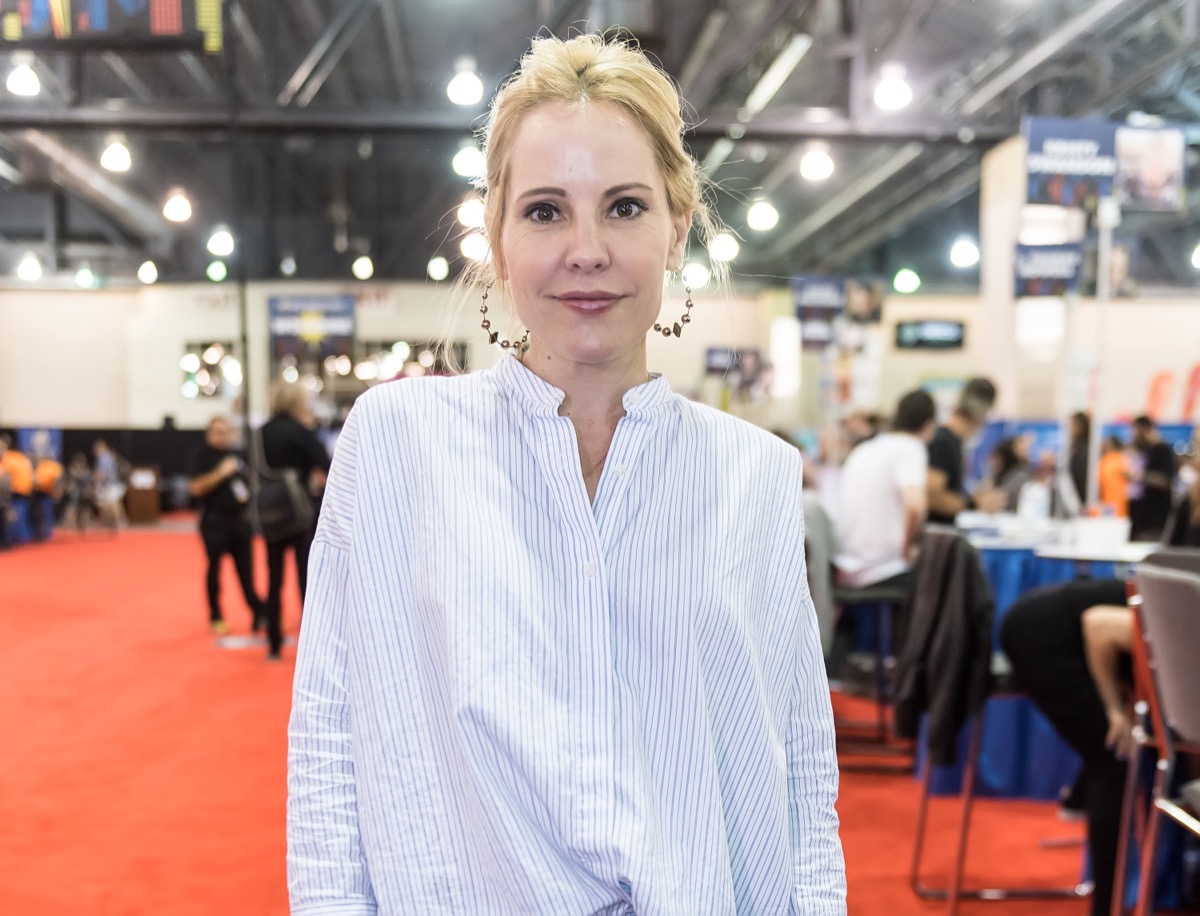’90s Teen Idol Says This Was Her First Symptom of MS

Ever since it first aired in 1997, aficionados of the supernatural have adored Buffy the Vampire Slayer, a show originally based on the 1992 film of the same name. The crew of Buffy eventually built seven seasons, an empire of novels, comics, and video games, continued viewership on streaming platforms, and of course a die-hard fanbase. One beloved character in later seasons of the show is Anya Jenkins, a former-vengeance-demon-turned-high-school-student who joins forces with Buffy and the “Scooby Gang” of teens battling forces of darkness in Sunnydale. Now Emma Caulfield, the actress who gave life to the socially awkward, endearing Anya, is revealing a long-kept secret about her health to her family, friends, and fans.
You won’t just recognize Caulfield from her Buffy years. She portrayed the clever, ambitious Susan Keats in season six of Beverly Hills 90210, as well as enchanted Westview resident Dottie Jones in Marvel’s streaming sensation WandaVision. Caulfield has decades of film and TV work to her name, and hopes to have years of acting ahead of her as well—but all of that was thrown into doubt when she was given a shocking health diagnosis in 2010, after experiencing some frightening symptoms. Read on for Caulfield’s first clue that something was amiss.
READ THIS NEXT: If You Notice This With Your Hands, It Could Be an Early Sign of MS.
Caulfield is just now revealing her 2010 diagnosis.

Like fellow actors Selma Blair, Christina Applegate, and Jamie-Lynn Sigler, Caulfield is going public about having multiple sclerosis (MS), a disease which affects the brain and nervous system, and can be disabling for some. According to the Mayo Clinic, there is currently no cure for MS, though treatment can be very effective at managing symptoms and speeding recovery from flare-ups.
For many years, her own father, who has since passed away, struggled with MS, Caulfield recently told Vanity Fair—explaining that hearing from her doctor that she, too, had the condition felt like “an out of body experience.” Despite her troublesome and mysterious symptoms, it took her some time to shake the shock of the diagnosis. Her initial response, she says, was an understandable, “No, that’s not possible.”
A frightening symptom prompted her to get an MRI.

Caulfield’s first clue that something was amiss with her body? “I woke up one morning and the left side of my face felt like there were a million ants crawling on it,” she told Vanity Fair, explaining that it was similar to the pins-and-needles feeling that can occur when you sit in one position too long. “I could still scratch [my face] and feel my nails,” she recalled, adding that the sensation was extremely dull. She knew something was off, so she made a visit to an acupuncturist, who seemed confounded, but suggested she might have Bell’s palsy, which can cause sudden (usually temporary) weakness in the muscles on one side of your face.
However, she could still move all her muscles, which would be strange for a Bell’s palsy diagnosis. “It was just constantly itching,” she explained. An MRI confirmed that it was MS, which can present in a whole host of ways, incuding itching, electric sensations of pain when nodding, eye pain, and even temporary vision loss.
Your health history can also play a huge factor in whether you’re likely to develop MS. A history with Epstein-Barr virus lands you at 32 times more likely to develop the disease, according to leading experts. And according to the UK’s National Health Service, while MS isn’t directly inherited from parents or grandparents, “people who are related to someone with the condition are more likely to develop it; the chance of a sibling or child of someone with MS also developing it is estimated to be around 2 to 3 in 100.” That means Emma Caulfield’s own six-year-old daughter is more at risk than the average kid. “It got me thinking about her and how full of joy and active she is,” Caulfield reflects, “and she’s just such a remarkable little creature.”
RELATED: For more up-to-date information, sign up for our daily newsletter.
She worried the diagnosis would affect her career.

“I’m so tired of not being honest,” Caulfield told Vanity Fair, explaining that she was terrified that if she told her co-workers and friends about the diagnosis, it would be a death knell for her career on the screen. “I didn’t want to give anyone the opportunity to not hire me,” she said, explaining how easy it is to write off an actor who seems like they might require even a hint of special treatment.
“There are already plenty of reasons to not hire people, reasons most actors don’t even know. ‘You look like my ex-girlfriend… You’re too short. You’re too tall. You look mean. You look too nice. You don’t have the right color eyes.’” She knew in her bones, she shares, that “if you talk about this, you’re just going to stop working. That’s it.”
Caulfield isn’t letting MS slow her down.

Despite any risk to future roles, Caulfield is ready to stop hiding, and she’s clear that she has no intentions of slowing down. “I am going back to work!” she shares excitedly. “Everyone has been notified that needs to be notified.”
Her next project will be reprising her role as Dottie for the new WandaVision spinoff show Agatha: Coven of Chaos. But this time, she’ll be proceeding smarter, and with more precautions, since she isn’t hiding her condition anymore. During filming for WandaVision, which had to shoot in the sweltering heat of August because of COVID-19 delays, the Atlanta heat was “unbearable” for her (heat sensitivity and flushing is a common struggle for those with MS, according to the National Multiple Sclerosis Society). “If people had known” about her condition, she reflects, “I could have had a little cooling suit underneath my top and kept my core cool.”
Going forward, Caulfield insists, “If I have a platform at all, I should be using it.” Now that she’s shared her story with the world, she intends to publicly promote the work that the MS Society is doing, in addition to giving financial donations. “I will be continuing to talk about this. This is not a one-time thing.”